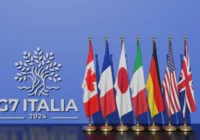Trump makes his first foreign policy speech in which he takes a stand against Bush-Clinton globalism and taps into the deep reservoir of resentment of long-suffering average Americans.
In a week when Shia protesters stormed Iraq’s parliament, Donald Trump made his first foreign policy speech. He meandered meaninglessly at times, was hopelessly contradictory as Fareed Zakaria points out and made patently false allegations against President Barack Obama. If one were to believe Trump, the “foreign-born Muslim president” engineered the election of the Muslim Brotherhood in Egypt and has treated Iran with “tender love and care” to make it “a great, great power.”
Trump is America’s Silvio Berlusconi without the Italian’s roguish charm or humor. Berlusconi hides his sinister side well, playing the part of an incorrigible ladies’ man whilst hiding his tax evasion and links to the mafia. By contrast, Trump is aggressively obnoxious. He damns Mexicans as rapists, lies compulsively and repeatedly trashes American leaders as stupid. Yet despite damning critiques of Trump, including a witty and well-researched one by John Oliver, “The Donald” bandwagon rolls on.
What is going on?
Well, the tragedy is that Trump has a point. Individually, American leaders may be clever but, collectively, they have been stupid. They have largely prized their short-term gains over their country’s long-term interests. This is a problem not unique to the US and afflicts most democracies. Far too often, elections are popularity contests. In land of Uncle Sam, growing partisanship, gerrymandering, increasing inequality, burgeoning amounts of money in politics and tightening control of media in the hands of a few corporations have made elections a circus.
These days the circus never stops. A bit like India, the US is always suffering election fever. Congressmen face re-election every two years. Primaries and campaigns are kicking off ever earlier. Congressmen rarely stay in the capital. They have three-day work weeks, with Monday and Friday as travel days when they are commuting to and from their constituencies. This does not leave much time for work or for socializing. It is little surprise then that partisanship has become toxic: It is easier to demonize others when you don’t eat or drink or spend time with them.
It is a cliché that Washington is broken. Congressmen have to raise a ton of cash and are always fundraising. They have abandoned much of their work to interns and staffers. These employees are horrendously underpaid. As E. Philip Lehman pointed out in The Washington Post, the only way to survive while working in Congress is to take on credit card debt or rely on one’s family. As Lehman put it memorably, “If the only way to thrive in Washington is by way of someone else’s bankroll, how can those entrusted to find policy solutions to this country’s problems come from anything lower than the upper middle class?”
Now, the smart people in Washington sometimes mention these problems, but they do precious little about them. Democracy anywhere in the world is messy but, in larger countries, it is exponentially so. The representatives are far too removed from the people. The rules are arcane and complicated. The bureaucracy is a behemoth where the right hand does not know what the left is up to. And as Trump points out, lobbyists, donors and special interests have too much power.
Trump is saying what many Americans have been thinking. In his speech he declared: “We will no longer surrender this country or its people to the false song of globalism.” Both Republicans and Clinton Democrats have been championing globalization or what Trump calls globalism. In 2001, Bill Clinton visited Harvard and credited globalization for “the rapid rise of technology, spread of democracy, and explosion of scientific knowledge.” Clinton failed to appreciate then, and perhaps fails to even today, the contradictions and challenges unleashed by globalization.
In the post-Soviet era, most of the world embraced markets and free trade. The promise of a new era of peace and prosperity beckoned. Larry Summers and Robert Rubin, Clinton’s consiglieres, ushered in an era of financial liberalization and threw the Glass-Steagall Act of 1933 out of the window. The lessons of the Great Depression were deemed to be irrelevant in this brave new world.
The Gramm-Leach-Bliley Act of 1999 that replaced Glass-Steagall defines the Clinton era more than anything else. “Slick Willie” declared that the new act would “enhance the stability of our financial services system.” From now on, the division between prudent commercial banking and risky investment banking was a thing of the past. Prescient predictions of people like Byron Dorgan, then a senator, were dismissed as the rantings of troglodytes.
The Clinton era inaugurated a time when financiers went haywire. Rubin was a former head honcho of Goldman Sachs. When George W. Bush ascended to the throne, the keys to the safe ended up in the hands of Hank Paulson, a successor of Rubin at Goldman. Bush cut taxes, increased spending and invaded not only Afghanistan but also Iraq. Economists talk about regulatory capture. It is fancy jargon for the fox guarding the henhouse. This is exactly what happened during the Clinton and Bush eras. It is little wonder that banks became too big to fail. Paulson walked through the revolving doors of Goldman into the Treasury to bail out his former friends on the grounds that stability trumped fairness.
Globalization inaugurated an era when companies turned footloose. Now, they could shut up shop and move production to a cheaper destination in a jiffy. Workers were often left high and dry. Wages dropped in richer economies as hundreds of millions entered the global labor market. Returns to capital increased as factories moved to China and call centers opened up in India. Rubin and Paulson did very well but the average American did not.
Rising house prices, cheap goods at Walmart and easy credit card debt hid the declining incomes for a while, but after the Great Recession the chickens have come home to roost. Americans are still hurting and low unemployment figures hide the fact that many have dropped out of the labor force altogether. Lost jobs and crumbling edifices dot the Rust Belt. Those who are not skilled enough to work at Apple or Google can be baristas and babysitters in the new service economy of the US. When Trump talks about making America wealthy again, he is tapping into memories of better times when things did not seem so hard.
On foreign policy, Trump is ridiculously confused but makes some bold points. He rightly terms Bush’s foreign policy a disaster where “logic was replaced by foolishness and arrogance.” He talks of the trillions of dollars wasted to no avail. Trump has also spoken of the US being overextended and of allies paying their fair share for security. None of this is entirely new, but Trump is touching a raw nerve by relentlessly questioning the status quo.
Many Americans are struggling. They are finding it hard to make ends meet. A large number do not feel optimistic about the future. They remember the halcyon days when they felt wealthier and life seemed simpler. Therefore, Trump’s slogan, “Make America Great Again,” is seductive in an anxious land. To use a phrase that Bobby Charlton used for Manchester United, Trump has created for his supporters “the theater of dreams” where they are willingly suspending disbelief.
The president has limited powers in the US. There are many things that require congressional approval. Obama’s nominee to the US Supreme Court is still cooling his heels. Even if elected by a large margin, Trump will not be able to do many things that he is promising. Congress is unlikely to play ball. Besides, Trump is a cad and a crook. Mr. Smith Goes to Washington, he ain’t.
Trump’s dodgy record and shady character does not matter though. The cult of success has strong roots in the US. On April 24, this author examined how Steve Jobs has been forgiven all his sins and been made into a god. Trump will not achieve deification. He has a very long shot at becoming president. He is not to be underestimated though.
A lifelong Democrat recently told this author that he was furious with Hillary Clinton. This Democrat was a supporter of Bernie Sanders but felt the primary was rigged against his man. A lady in the pay of Goldman Sachs was getting most of the coverage and was waltzing off with the nomination. He claimed that the Democrats were more Mafiosi than the Republicans and that the control of the Clintons over the party was nauseating. Finally, this supporter of Sanders declared that he would rather vote for someone rich instead of someone in the pocket of the rich. Between Clinton and Trump, he would choose The Donald.
Democracy needs debate, discussion and deliberation. These require trust. This commodity is running low. Instead, there is widespread revulsion with the system. This is what gives the Americano Berlusconi a chance.
*[You can receive “The World This Week” directly in your inbox by subscribing to our mailing list. Simply visit Fair Observer and enter your email address in the space provided. Meanwhile, please find below five of our finest articles for the week.]
A Conversation on Child Marriage With Amnesty International
There are currently 700 million women living today who were married before their 18th birthday.
Child marriage is on the decline, but it is a slow progress. There are currently 700 million women living today who were married before their 18th birthday—or 10% of the total global population. In the developing world, the figure is at a staggering one third of girls under the age of 18.
Early and forced marriage not only strips girls of their childhood, but also their future. Girls married young are often taken out of school prematurely, which helps perpetuate the cycle of child marriage: Uneducated girls are more likely to become child brides, while uneducated parents are more likely to marry their children off. As a result, this diminishes the prospects of girls living fulfilling lives and exacerbates gender inequality worldwide.
The international community has recognized child marriage as one of its most pressing development issues, and has made exceptional efforts… Read more
The Fight for Ignorance in American Media
Public access to information is being controlled by those who seek to profit from our collective ignorance.
It is reasonable to ask how Americans have permitted their nation’s march to self-proclaimed greatness to be so retarded by its present collective march to self-induced ignorance. With ignorance oozing from so many pores, it is hard to know where to start. I am going to start with the media. As hard as it is to believe now, there was a time when Americans were informed about the events of the day by well-respected professionals actually reporting the news and delivering it to an audience seeking hard news from which that audience could reach its own conclusions.
Today’s media model has virtually nothing to do with reporting the news and everything to do with participating in the news. And today’s audience has become so anesthetized to the endless patter that the distinction between fact, opinion and nonsense is hopelessly blurred… Read more
Water as a Strategy of War
In times of war, lack of access to safe water can kill as many people as bombing.
Inequality in the distribution of water resources and risks of shortage are contributing causes of tension and conflict between states. The conflict in Darfur, characterized by rivalry between local communities and tribes for access to arable land and water resources, is a prime example of such a relationship between conflict and scarcity of natural resources.
Yet there is another dynamic: Armed conflicts also damage water resources both in the short and long terms, compromising both the health and, in some circumstances, the survival of local populations.
Unlike peacetime legislation, the law of armed conflict (or international humanitarian law) contains few rules that relate directly to the protection of freshwater resources. Nevertheless, access to and the protection of water installations may be significantly affected by wars. Dams and dykes have often represented an attractive target for the parties in a conflict… Read more
Migration is Here to Stay
Much of the policy discourse on migration continues to harp on its destabilizing effects without recognizing its transformative potential for the poor.
Migration has been a recurring phenomenon throughout human history. Since time immemorial, man has perpetually been on the move in search of greener pastures and greater opportunities. These migratory movements have been a potent force in shaping the cultural landscape and political configuration in much of the modern world. Had it not been for migrant labor, some of the world’s greatest metropolitan cities would probably not have taken shape. There would have been no London, New York, Tokyo, Beijing or Mumbai.
Yet migration continues to be viewed as an essentially destabilizing process, which probably explains why it has been so conspicuous by its absence from much of the current development discourse. At a moment when the world is grappling with the worst migration crisis since the Second World War, it becomes all the more necessary to… Read more
Why the Panama Papers Are a Feminist Issue
Those most impacted by the consequences of tax dodging are the world’s poorest, who are disproportionately women and girls.
Asana Abugre has a small shop in Accra, Ghana, where she makes and sells batiks and tie-dyed textiles. Asana pays her taxes regularly. Women like her, working in markets across the city, sometimes pay up to 37% of their income in tax. Tax collectors come to their shops to collect taxes, and there is no chance of them not paying, regardless of how little money they might have made that day.
Of course, this isn’t the tax story that everyone’s been talking about. The release of the Panama Papers by the International Consortium of Investigative Journalists (ICIJ) is the biggest data leak in history, and this time it’s some of the world’s most powerful people who have cause to worry, with the spotlight finally falling on their own secretive tax arrangements. But the two stories are linked. When those… Read more
The views expressed in this article are the author’s own and do not necessarily reflect Fair Observer’s editorial policy.
Photo Credit: Gino Santa Maria / Shutterstock.com
 We bring you perspectives from around the world. Help us to inform and educate. Your donation is tax-deductible. Join over 400 people to become a donor or you could choose to be a sponsor.
We bring you perspectives from around the world. Help us to inform and educate. Your donation is tax-deductible. Join over 400 people to become a donor or you could choose to be a sponsor.
Support Fair Observer
We rely on your support for our independence, diversity and quality.
For more than 10 years, Fair Observer has been free, fair and independent. No billionaire owns us, no advertisers control us. We are a reader-supported nonprofit. Unlike many other publications, we keep our content free for readers regardless of where they live or whether they can afford to pay. We have no paywalls and no ads.
In the post-truth era of fake news, echo chambers and filter bubbles, we publish a plurality of perspectives from around the world. Anyone can publish with us, but everyone goes through a rigorous editorial process. So, you get fact-checked, well-reasoned content instead of noise.
We publish 2,500+ voices from 90+ countries. We also conduct education and training programs
on subjects ranging from digital media and journalism to writing and critical thinking. This
doesn’t come cheap. Servers, editors, trainers and web developers cost
money.
Please consider supporting us on a regular basis as a recurring donor or a
sustaining member.
Will you support FO’s journalism?
We rely on your support for our independence, diversity and quality.











